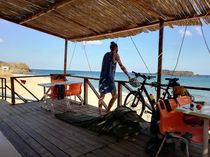Kontakt
Erasmus+ student mobility
Erasmus+ coordinator
Links
At the University of Oldenburg:
Greenhouse gas balance of stays abroad by University of Oldenburg members
Promoting green travel
With Erasmus+ Green, one of the overarching themes of the current Erasmus+ programme generation, sustainability is firmly anchored in Erasmus+.
Students and university staff who have been going abroad in Europe via Erasmus+ since the 2021 Erasmus project receive a top-up amount for green travel. Since the 2024 call, the European Commission has been calling on Erasmus+ participants to use low-emission means of transport for trips of less than 500 km.

What is green travel?
Green travel is defined as trips where the majority of the journey is made by low-emission means of transport such as bus, train or car-pooling. Trips involving air travel are not eligible.
What are the top-ups for green travel?
- Students will receive a one-off payment of €100 and, where applicable, additional support for travel days of up to 4 days for a return journey. The additional payment (top-up plus allowance for up to four travel days) is made at the end of the study abroad or mobility. The grant is financially supported on a pro-rata basis by the university's climate protection management.
- University staff receive a different amount depending on the travel distance and, if applicable, additional individual support for up to 4 travel days for a return trip (see Erasmus+ funding).
Proof of sustainable travel
The travel days (up to 4) should be justified or documented using tickets if possible. If this is not possible, participants may provide a declaration based on their word of honour. The declaration should include the number of days of travel.
Funding option for particularly sustainable travel on foot or by bicycle
In addition, students who travel using particularly sustainable forms of travel, i.e. students who travel to the host university mainly on foot (hiking) or by bicycle, will receive a one-off grant of up to 350 euros.
Prerequisite for this additional funding:
- Informal application with a description of the project (including a listing of additional costs)
- For a journey of up to 200 kilometres to the host university, 200 euros will be reimbursed; for a journey of more than 200 kilometres, 350 euros will be reimbursed.
- Proof or self-declaration on the journey made (type of travel, reference to environmental friendliness)
Grantees are required to write a report using the hashtag #UOLinternational (social-media@uol.de will be happy to provide support).
Grantees should take care to ensure that the CO2 savings achieved by a sustainable form of travel are not cancelled out example by sending their luggage separately by air or by flying back home, so students should make it clear that the aspect of environmentally friendly travel is a particular focus of their project.
Funding is granted as soon as the study abroad has begun and proof/self-declaration on the journey has been provided.
Oldenburg students' experiences with sustainable mobility
Lennart Zembsch on his way to the Erasmus programme in Greece
Carmen Sroweleit, Jil Gagelmann and Jasper Laschinger travelling by bike
Their semester abroad by bike (in German)
Greenhouse gas balance of stays abroad
Every year, the University of Oldenburg calculates the greenhouse gas emissions caused by its activities. This balance also includes emissions caused by students travelling to and from their host universities during their semesters abroad. We therefore ask you to participate in a survey after returning from your stay.
Take part in the climate protection management surveyClick here for the latest greenhouse gas balance of the University of Oldenburg
Interrail pass for Erasmus+
The Interrail Pass was created for Erasmus+ participants and facilitates sustainable travel to and from a stay abroad within Europe. The passport was created in coordination with the Erasmus Student Network (ESN) and is based on the Erasmus+ programme.










